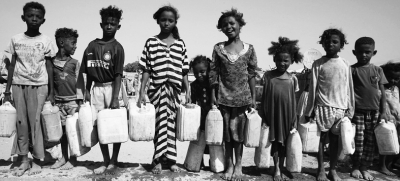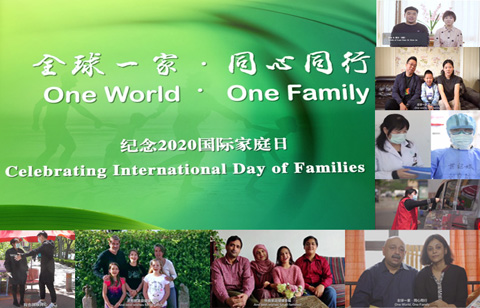UNICEF: One Billion Children at 'Extremely High Risk' of Impacts of Climate Crisis
Date:2021-8-28 15:54:28 Views:
In a settlement in Aden, Yemen, displaced children take containers to fetch water twice a day. [UNOCHA/Giles Clarke]
According to a report launched by the United Nations Children's Fund (UNICEF) on August 20, young people living in the Central African Republic, Chad, Nigeria, Guinea and Guinea-Bissau are the most at risk of the impacts of climate change, threatening their health, education, and protection, and exposing them to deadly diseases.
The report, titled "The Climate Crisis Is a Child Rights Crisis: Introducing the Children's Climate Risk Index (CCRI)" is the first comprehensive analysis of climate risks from the perspective of children. It ranks countries based on children's exposure to climate and environmental shocks, such as cyclones and heat waves, as well as their vulnerability to those shocks, based on their access to essential services.
Launched in collaboration with Fridays for Future on the third anniversary of the youth-led global climate strike movement, the report finds approximately one billion children — nearly half the world's 2.2 billion children — live in one of the 33 countries classified as "extremely high-risk."
These children face a deadly combination of exposure to multiple climate and environmental shocks with a high vulnerability due to inadequate essential services, such as water and sanitation, healthcare and education. The findings reflect the number of children impacted today — figures likely to get worse as the impacts of climate change accelerate.
UNICEF Executive Director Henrietta Fore said, "For the first time, we have a complete picture of where and how children are vulnerable to climate change, and that picture is almost unimaginably dire. Climate and environmental shocks are undermining the complete spectrum of children's rights, from access to clean air, food and safe water; to education, housing, freedom from exploitation, and even their right to survive. Virtually no child's life will be unaffected."
"For three years, children have raised their voices around the world to demand action. UNICEF supports their calls for change with an unarguable message — the climate crisis is a child's rights crisis," Fore added.
The CCRI reveals:
- 1 billion children are highly exposed to exceedingly high levels of air pollution;
- 920 million children are highly exposed to water scarcity;
- 820 million children are highly exposed to heat waves;
- 815 million children are highly exposed to lead pollution.
While nearly every child around the world is at risk from at least one of these climate and environmental hazards, the data reveal the worst affected countries face multiple and often overlapping shocks that threaten to erode development progress and deepen child deprivations.
It is estimated that 850 million children, nearly one in three worldwide, live in areas where at least four of these climate and environmental shocks overlap. As many as 330 million children, one in seven worldwide, live in areas affected by at least five major shocks.
The report also reveals the disconnection between where greenhouse gas emissions are generated and where children are enduring the most significant climate-driven impacts. The 33 "extremely high-risk" countries collectively emit just nine percent of global CO2 emissions. Conversely, the 10 highest emitting countries collectively account for nearly 70 percent of global emissions. Only one of these countries is ranked as "extremely high-risk" in the index.
UNICEF is calling on governments, businesses and relevant actors to take actions such as increasing investment in climate adaptation and resilience in key services for children, reducing greenhouse gas emissions, and providing children with climate education and green skills, which is essential for them to adapt to and prepare for the effects of climate change. It also suggests involving young people in all national, regional and international climate negotiations and decisions, including the 26th session of the Conference of Parties to the UN Framework Convention on Climate Change. UNICEF emphasizes that ensuring recovery from the COVID-19 pandemic should be a green, low-carbon and inclusive process so that it will not affect the capacity of future generations to deal with and respond to the climate crisis.



